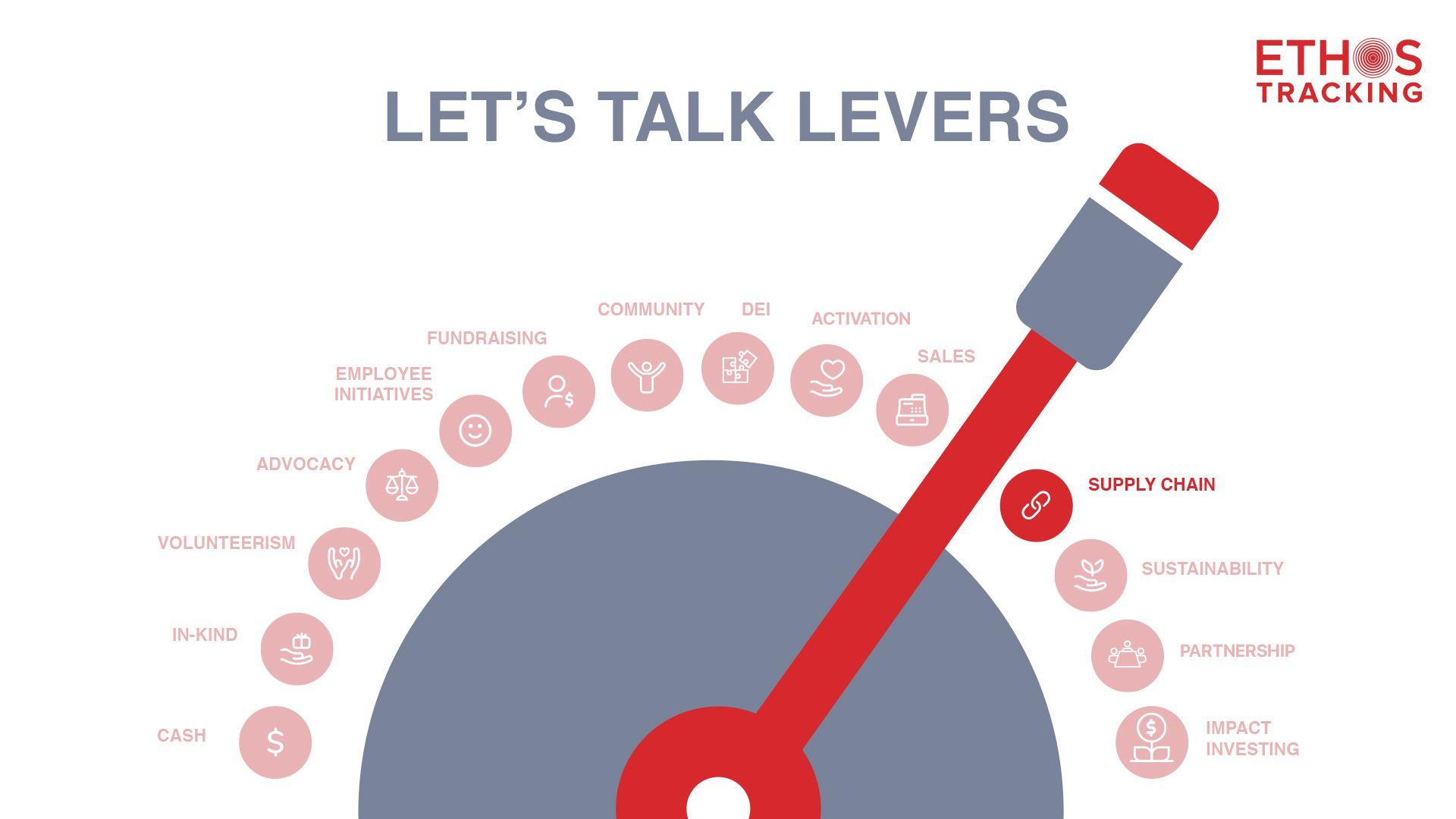The Ethos Lever Model
The Ethos Lever Model utilizes fourteen different “Levers” by which an organization can make an impact. Each Lever serves a real opportunity to create value - but when strategically pulled together, result in a powerful and cohesive Social Impact strategy. See all 14 Levers here.
In this blog series, the Ethos team breaks down each Lever - complete with expanded definitions and real-life examples - so you can best understand how to pull the right Levers through your organization's social impact work.
Supply Chain
Supply Chain is defined as advancing social and environmental goals and prioritizing mission-aligned vendors.
Maximize Supply Chain Efforts:
- Invite transparency by leading with example
- Ensure all vendor partners align with company’s mission
- Communicate to partners that the company must understand how they support employees and their family members. If no relevant policies are in place, provide partners with a toolkit and training opportunities
- Craft a survey for vendors the company works most regularly with
- Consider requiring vendors to participate in training sessions
- Where appropriate and relevant, prioritize working only with vendors that are mission aligned
- For example, Creative Matters -- a creative agency built for nonprofits and staffed by those recovering from substance abuse
- This strategy can be expanded to every level of operations, including, for example, the restaurant from which the company orders lunch every day
- Communicate to partners that the company must understand how they support employees and their family members. If no relevant policies are in place, provide partners with a toolkit and training opportunities
Supply Chain: Three Real-Life Examples
(1). Tony Chocolony: A Dutch ethical brand is inviting chocolate makers to become a transparent supply chain platform to create a more sustainable cocoa industry.
Tony Chocolany mission is to make 100% slave-free chococlate and have others upgrade to Tony’s open-source cocoa sourcing initiative. They are working to end modern slavery and illegal child labor in the chococalte industry. Tony’s 5 Sourcing Principles (using 100% traceable cocoa beans, paying a higher price, supporting strong farmers by strengthening cooperatives, engaging in long-term direct partnerships, and focusing on cocoa quality and productivity to optimize yields) helps to bring human rights, sustainability, and supply chain to the open. Tony's Open Chain helps chocolate brands transform their cacao supply chain in order to become sustainability frontrunners. Changing the supply chain is having enormous benefits by helping create slave free chocolate, but also by doing this it has improved their sustainability and human rights efforts. This one change has not revolutionized and expanded their social impact strategy, but has also helped many brands do the same.
(2). Chipotle: Chipotle believes in cultivating a better world through surviving responsibly sourced, classically-cooked, real food with ingredients without artificial colors, flavors or preservatives. They are also committed to making food accessible to everyone while still being a brand that demonstrates purpose and being a leader in the food industry.
Chipotle made the decision that they want to ensure that they have the right thing for farmers, for animal welfare, and for human health. They began this supply chain change by starting to serve Responsibly Raised-brand meat from animals being raised in more humane ways. As well as ensuring that these animals were using without the use of antibiotics or added hormones. Chipotle is happy to announce that all the company’s meat comes from animals raised without antibiotics.
What Chipotle has achieved:
- Purchased more than 28.1 million pounds of organic and transitional ingredients
- Purchased more than 31 million pounds of local produce – an investment of more than $23.3 million into local food systems
- Committed $5 million to young farmers over five years
Upcoming Goals:
- Partner with Chipotle growers to convert more than 400 acres of conventional farmland to organic farmland via transitional growing methods by 2025
- Purchase more than 37 million pounds of produce from local farmers through its Local Growers Program in 2021
- Chipotle understands and acknowledges that it is an industry problem that they wish others will make a priority well.
(3).Levi Strauss: Levis Strauss is an American clothing company best known for their denim jeans. They have made it a point to be transparent about their supply chain. Levi’s has made a record-breaking green supply chain by ensuring their fashion supply chain responsiveness and transparency, extended their green supply chain practices, and promoted public green choice in the apparel market.
Levi Strauss pioneered a comprehensive workplace code of conduct with suppliers through designing a Supply Chain Sustainability guidebook and Global Terms of Engagement. This was made to help improve the lives of the people manufacturing the products by requiring that they are treated with dignity, respect, fairness and are in a safe environment.
Supply Chain transparency was pioneered 30 years ago and continues to grow as society is changing. In 2020, when COVID-19 began there were additions made covering: gender equity, foreign migrant worker protections, freedom of association, wages and benefit requirements, and robust health and safety guidelines in response to the COVID-19 pandemic and to address multi-story building risks.
Levi Strauss has also limited the brand’s water usage and chemicals that are needed to create its jeans. Other innovations include software and lasers that help to further automate the production process and reduce the chemicals that are being used. As well as testing and research of textiles to find safer production processes and lastly innovative materials by integrating hemp in its supply chain. These innovations are helping to decrease the amount of chemicals, use less water, and be able to expand transparency initiatives.

